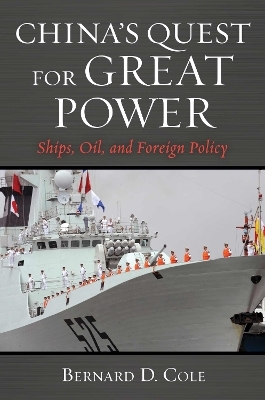
China's Quest for Great Power
Ships, Oil, and Foreign Policy
Seiten
2024
Naval Institute Press (Verlag)
978-1-68247-943-8 (ISBN)
Naval Institute Press (Verlag)
978-1-68247-943-8 (ISBN)
Examines China’s national security strategy by looking at the three major elements-foreign policy, energy security, and naval power-all interactive and major influences on China’s future and its relations with the United States.
This book examines China's national security strategy by looking at the three major elements-foreign policy, energy security, and naval power-all interactive and major influences on China's future and its relations with the United States. A decade and a half into the twenty-first century, Beijing requires reliable access to energy resources, the navy to defend that access, and foreign policies to navigate safely toward its goals. Most importantly, the People's Liberation Army-Navy (PLAN) must be able to safeguard China's regional maritime interests, especially the sovereignty disputes involving Taiwan and the Yellow, East China, and South China Seas. Many Chinese naval officers and analysts think the United States is determined to contain China and prevent it from achieving the dominant historical position to which it is entitled. This view has been strengthened by Washington's shift to Asia, transfer of naval units to the Pacific, and the March 2015 Maritime Strategy released by the U.S. Navy, Marine Corps, and Coast Guard. China's relationship with the United States is vital to both countries and to the world. The relationship is based on both common and divergent interests in economics, military operations, and political goals and methods. China's international trading economy and ambition for a world-class navy require effective foreign diplomacy and participation in global affairs. This policy trifecta in large part defines China's posture to the world. Beijing is approximately halfway toward its mid-century goal of deploying a navy capable of defending China's perceived maritime interests. China's priorities follow President Xi Jinping's definition of national security as "comprehensive, encompassing politics, the military, the economy, technology, the environment and culture." What this means for future Chinese foreign policy choices, as naval modernization and energy security concerns enable different courses of action, lies at the center of this book's conclusions.
This book examines China's national security strategy by looking at the three major elements-foreign policy, energy security, and naval power-all interactive and major influences on China's future and its relations with the United States. A decade and a half into the twenty-first century, Beijing requires reliable access to energy resources, the navy to defend that access, and foreign policies to navigate safely toward its goals. Most importantly, the People's Liberation Army-Navy (PLAN) must be able to safeguard China's regional maritime interests, especially the sovereignty disputes involving Taiwan and the Yellow, East China, and South China Seas. Many Chinese naval officers and analysts think the United States is determined to contain China and prevent it from achieving the dominant historical position to which it is entitled. This view has been strengthened by Washington's shift to Asia, transfer of naval units to the Pacific, and the March 2015 Maritime Strategy released by the U.S. Navy, Marine Corps, and Coast Guard. China's relationship with the United States is vital to both countries and to the world. The relationship is based on both common and divergent interests in economics, military operations, and political goals and methods. China's international trading economy and ambition for a world-class navy require effective foreign diplomacy and participation in global affairs. This policy trifecta in large part defines China's posture to the world. Beijing is approximately halfway toward its mid-century goal of deploying a navy capable of defending China's perceived maritime interests. China's priorities follow President Xi Jinping's definition of national security as "comprehensive, encompassing politics, the military, the economy, technology, the environment and culture." What this means for future Chinese foreign policy choices, as naval modernization and energy security concerns enable different courses of action, lies at the center of this book's conclusions.
Capt. Bernard D. Cole, USN (Ret.), is professor emeritus at the National War College. During his Navy career he commanded the USS Rathburne (FF 1057) and Destroyer Squadron 35, and also served as a naval gunfire liaison officer with the 3rd Marine Division in Vietnam from June 1967 to July 1968. He earned a PhD in history from Auburn University and was named the 2014 Naval Institute Press "Author of the Year." This is his eighth book on Asian energy security and maritime affairs.
| Erscheinungsdatum | 28.02.2024 |
|---|---|
| Zusatzinfo | 3 Maps |
| Verlagsort | Annopolis |
| Sprache | englisch |
| Maße | 156 x 235 mm |
| Gewicht | 359 g |
| Themenwelt | Geschichte ► Teilgebiete der Geschichte ► Militärgeschichte |
| Naturwissenschaften ► Biologie ► Ökologie / Naturschutz | |
| Sozialwissenschaften ► Politik / Verwaltung ► Europäische / Internationale Politik | |
| Sozialwissenschaften ► Politik / Verwaltung ► Staat / Verwaltung | |
| ISBN-10 | 1-68247-943-9 / 1682479439 |
| ISBN-13 | 978-1-68247-943-8 / 9781682479438 |
| Zustand | Neuware |
| Haben Sie eine Frage zum Produkt? |
Mehr entdecken
aus dem Bereich
aus dem Bereich
neueste Manipulationstechniken als Waffengattung der NATO
Buch | Softcover (2023)
Westend (Verlag)
24,00 €
Deutschlands Schwäche in der Zeitenwende
Buch | Softcover (2023)
C.H.Beck (Verlag)
18,00 €


